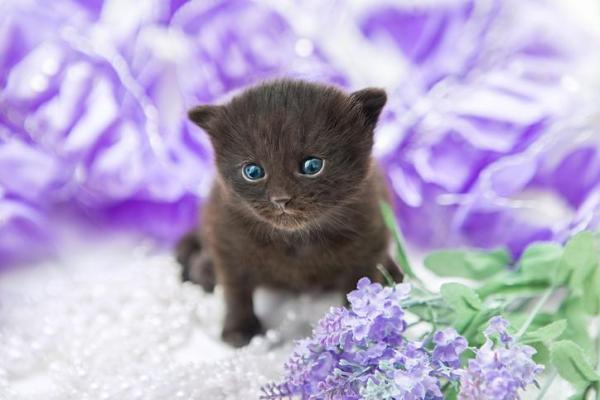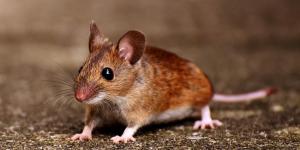Aromas that Attract Felines



See files for Cats
A cat's sense of smell is 14 times better than a human's, so it's much more developed and allows them to perceive scents more intensely. This advantage is very useful to detect smells and aromas that attract them most, as well as quickly identify those they hate. Some aromas can make a feline go crazy with excitement. This is because cats react to certain compounds in a way which has an almost narcotic effect. Strangely, these compounds can affect different cats differently. Some may not take any notice of them at all. With this in mind, what scents do cats like?
If you like to fill your home with nice smells, we should take our cat into consideration. We share 10 aromas that attract felines which you can use to get your cat to come to you. We also explain why we need to be careful to only provide aromas in a safe way.
- Catnip
- Olive
- Honeysuckle
- Lavender
- Thyme
- Spearmint
- Basil
- Peppermint
- Grass smell
- Fruit scents
- Can cats smell toxic plants?
- What is your cat's favorite smell?
Catnip
Commonly known as catnip, Nepeta cataria exerts a powerful narcotic effect on most felines. The active ingredient found in the composition of the plant is nepetalactone produces a psychoactive impact on these cats that lead them to become stimulated and will encourage play. When a feline smells the aroma given off by catnip, they tend to rub against it, lick it, eat it, show unusual behavior (such as jumping) and even hunt non-existent animals.
As it stimulates the mind of the animal and keeps them active, catnip is one of the most beneficial plants for them. However, while it is perhaps the smell that attracts cats the most, this does not apply to all felines equally. Some individuals do not respond to the plant in the same way. This is because the catnip response is genetic and some simply don't have the DNA to be able to appreciate it[1].

Olive
Considered as another of the smells cats like, the olive tree also produces a narcotic effect that alters a cat's behavior. This is because one of the most active components in the olive tree's leaves and trunk is a substance called oleuropein. As with catnip, when a receptive feline perceives this smell, they tend to rub, lick, eat its leaves and show a more active attitude, action similar to the attitude they have during mating behavior.
Some cats have this attraction to just olive leaves, while others are attracted by all the parts the olive tree. This includes the olives themselves and products such as olive oil. Likewise, it has still not been scientifically proven that this smell exerts a relaxing effect on cats so we make this claim cautiously. It certainly does affect their central nervous system and makes them more active and playful.
Learn more about the potential benefits of olive oil for cats to learn more.

Honeysuckle
Honeysuckle is part of a group pf plants popularized as Bach flowers. Strong claims have been made about the effects of these Bach flowers, with some defying the evidence of science if not common credulity. We can say that it provides one of the scents that cats like in many cases. Smelling the aroma of honeysuckle may help to calm and relax them. This may be helpful if the cat is dealing with insomnia, stress or anxiety.
As with the previous plants, the composition of honeysuckle attracts cats and makes them want to rub themselves against the floor, licking it and eat it. While the leaves are fine, we must be aware that honeysuckle berries are toxic for cats. It is essential to keep them away from these berries. Do not let them eat any part of this plant, just sniff it and enjoy its aroma.

Lavender
As with us humans, the aroma given off by lavender attracts cats by drawing them towards it. Its power of attraction is not as strong as the previous plant and it is possible that some cats will not display any interest at all. Moreover, this may be a scent some cats hate. The reasons are little known, although it is possibly due to similar to genetic reasons as to why catnip is attractive or it is simply personal preference on behalf of the cat.
If your furry companion is one of these cats that love the smell of lavender, you can use it to encourage a state of relaxation. Especially in cases of anxiety and even a small degree of aggressiveness, it may be possible this smell acts therapeutically. Using it along with other relaxing factors such as generating a tranquil space can help the cat to feel much calmer.
Cats do not like essential oils. As their sense of smell is so strong, any essential oil can be too overpowering. They are also often toxic if ingested. Don't be too heavy handed with smells which are supposed to be calming scents for cats. If used in a diffuser or heavily diluted, it might mimic the enjoyable scent of fresh lavender.
Lavender and cats does come with a specific stipulation as eating the plant is toxic for the cat. It is important the cat is not able to ingest the flowers or leaves.
Learn more about how lavender might have the opposite effect with our article on natural scents to stop a cat spraying.

Thyme
Used by ourselves in the kitchen thyme is one of the smells that attract felines. It is said to have various uses as a home remedy, but many of these are not well supported by science. What research has shown is that it contains thymol, a phenol derivative which has good antiseptic properties. It also contains triterpenes and tannins which may be able to contribute to overall good health.
On the other hand, the aroma of thyme may act as a natural relaxer and promotes calmness in the cat. To do so, you should ideally use the essential oil of thyme or purchase this aromatic plant. However, as with lavender, thyme may not be as effective for all cats and no feline should ingest the essential oil directly.

Spearmint
Part of the same family as catnip (Lamiaceae), spearmint is an aroma which can be attractive to some cats. Keeping a spearmint plant near their litterbox can be a good way to help ensure the animal is calm when defecating or urinating. This is particularly important if a cat has trouble peeing or even if they lack bladder control.

Basil
Another cat-friendly aroma most associated with the culinary arts is basil. Dried basil will probably not have much effect, but the fresh leaves of the plant can have a strong scent to attract cats. It is known to have some insecticidal properties when used as an essential oil, although it maty not always work as a repellant.

Peppermint
Another plant from the Mentha genus which might attract your feline, peppermint is a hybrid cultivar which is often used in confectionary. Not all cats will be attracted to this smell, but those that are may play with it similar to how they would with catnip. It is not a plant toxic for cats, so you will not need to worry if you see your cat eating peppermint leaves. However, they should not be eaten in large amounts.

Grass smell
Many cats feel overwhelmed by the intense smell of some flowers like roses, daisies and lilies. If this is the case with your cat, you should know that some of them are highly toxic if they ingest them, such as the last two mentioned. In this way, it is better to keep cats away from the actual plant to avoid a possible intoxication.
Other flowers may be quite attractive to cats. However, generally speaking, the cat is more interested in the leaves and stems of plants. This can be seen in cats eating certain types of grass. Why cats eat grass is poorly understood, but it is believed it may help with digestion. Some plants can be toxic, so we need to be careful what plants we keep in the home or garden.
Some plant leaves and flowers are toxic to cats, so we need to be careful with plants like poinsettia and felines.

Fruit scents
Fruits such as strawberries, peach or watermelon, emit very distinctive and intense aromas that capture the attention of cats quickly. In this sense, certain scents can certainly attract cats and encourage them to try the food. Many of them even have multiple benefits for their body, such as antioxidant, cleansing and diuretic properties, as well as fiber and lots of vitamins. However, not all fruits are attractive to these animals, since citrus fruit emits a really unpleasant scent for them.
If you notice that your cat is attracted by the smell of some fruits, don't miss our article with the list of fruits most recommended for cats and start to offer them as a reward.

Can cats smell toxic plants?
There needs to be a clarification when it comes to knowing what smells cats like. The reason is that many people don't realize that just because a cat likes the smell, it doesn't mean they will eat it. For example, lavender is a smell which attracts some cats, but ingestion is toxic and can lead to poisoning. Just as our fruit scented shampoo might smell lovely, but we don't take a gulp, cats can enjoy smells without eating their source.
Unlike humans, cats are not always able to be discerning with what they eat. In this way, we need to ensure they do not ingest anything harmful. Use a diffuser to emit the scent or avoid scent bags which can be easily opened by the cat. If your cat does ingest something toxic, look out for any adverse symptoms and take them to a veterinarian if poisoning is likely.
What is your cat's favorite smell?
After reviewing the list of aromas that attract felines, what is the smell your cat loves the most? We are sure that you have identified that there is a certain plant, food or object that has a certain effect on your furry friend and they quickly run towards it with enthusiasm when its around.
As we have already been indicating throughout the article, not all mentioned odors are welcome for all cats, since each animal has their own tastes. In this way, it is possible that a feline adores the smell that thyme gives, but rejects lavender completely. We encourage you to check the post to explain 10 smells that cats hate to learn more.

If you want to read similar articles to Aromas that Attract Felines, we recommend you visit our Facts about the animal kingdom category.
1. Bol, S., et al. (2017). Responsiveness of Cats (Felidae) to Silver Vine (Actinidia polygama), Tatarian Honeysuckle (Lonicera tatarica), Valerian (Valeriana officinalis) and Catnip (Nepeta cataria). BMC Veterinary Research, 13(70).
https://doi.org/10.1186/s12917-017-0987-6
- González García, A., Herranz Vega, M. S., & Sánchez-Fortún Herrero, A. (2017). ¿La hierba gatera merece ese nombre? Revista Complutense de Ciencias Veterinarias, 11(Especial), 12–17. https://doi.org/10.5209/RCCV.55175
- Alabort Amundarain, S., Pineda González, S., Olivares Moreno, A., & Ibáñez Talegón, M. (2017). Ansiedad generalizada y agresividad intraespecífica en gatos: Descripción de un caso clínico. Revista Complutense de Ciencias Veterinarias, 11(2), 17–26. https://doi.org/10.5209/RCCV.55176







 I had no idea about the other plants!
I had no idea about the other plants!










